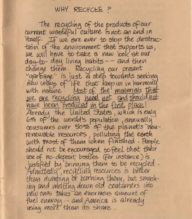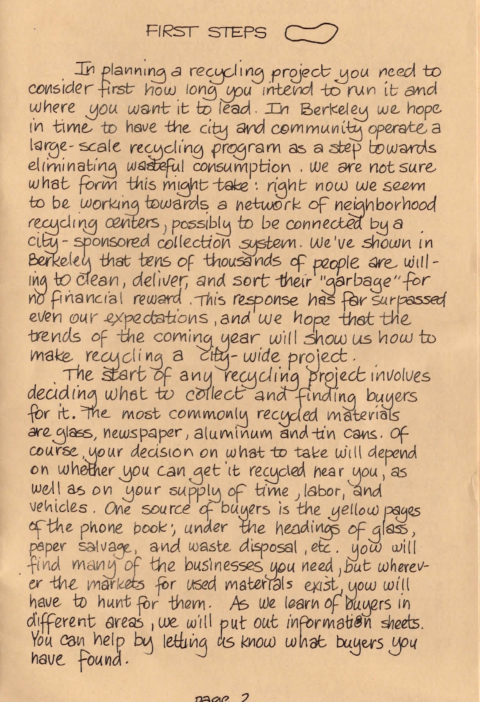This Ecology Action pamphlet, on “how to start a neighborhood recycling center,” comes across as a quaint, handwritten letter to a friend. It is personal in both its instructional language and its choice of handwriting over type. (The only typed writing is on the front for their sponsor.)
We can guess it was created around 1969-1970 because the pamphlet refers to their recycling program being active for one year. (This is also the second edition of the pamphlet.) The writing instructs readers how to start a small recycling center, sharing their own best practices from their year-long experience. It gives people concerned about the environment a manageable way to turn their consciousness into an action.
In the pamphlet’s opening pages, the authors note that, in Berkeley, their initial efforts far surpassed their expectations, with tens of 1000s of people willing to sort their “trash” for no financial reward. They also write that it is unclear how recycling will develop in the city — though they project that the city may end up coordinating efforts among a group of neighborhood recycling centers.
The step-by-step instructions guide the reader through the many things they need to do and consider if they are interested in starting a recycling center. It also offer more in depth information about recycling in general, demystifying the process of how a glass bottle get turned into a new one. Find a buyer, what materials they will take, and how they need to be prepared. Find a location that can accommodate noise and smell. Use drop off as a opportunity to engage people further. People need to prepare materials at home- removing labels from glass and flattening cans, removing rings from bottles, etc. Consider how to store and transport materials. Common items that people think are recyclable but are not. How to talk to city officials about helping. Suggestions of other ways to live ecologically.
The last piece of  the document explains Ecology Action’s guiding ideology on recycling, which differs greatly from why people recycle today. Recycling is better than sending everything to the dump, but ideally, we would not have produced the objects at all.
the document explains Ecology Action’s guiding ideology on recycling, which differs greatly from why people recycle today. Recycling is better than sending everything to the dump, but ideally, we would not have produced the objects at all.
Through information and intervention, the goal is to create prevention of recycled materials because that would be best for the earth. Processing recycled glass and plastics to make new material takes a lot of energy.They suggest centers opt for reuse items before they are recycled. As an ecological recycler asking people to reduce their impact, they think recyclers need to operate therefore in the least wasteful way. Therefore, Ecology Action “tr[ies] to use non-polluting human muscle power whenever possible”.
It is offered for free and is openly reproducible, a common courtesy of the counterculture movement who were more interested in information sharing than profits. For additional copies, there is an ask for a donation or, alternatively stamps to cover the mailing cost, a modest request. Ecology Action served as a resource for ecology related information. Mentioned within the pamphlet, and evidenced by their mass of correspondence with school representatives and concerned neighbors, they sent out a lot of handbooks, pamphlets, and flyers at the request of the public who wanted to further distribute their material. Through documents like this pamphlet, they were informing people of the conditions of the environment and how to actively create change.
